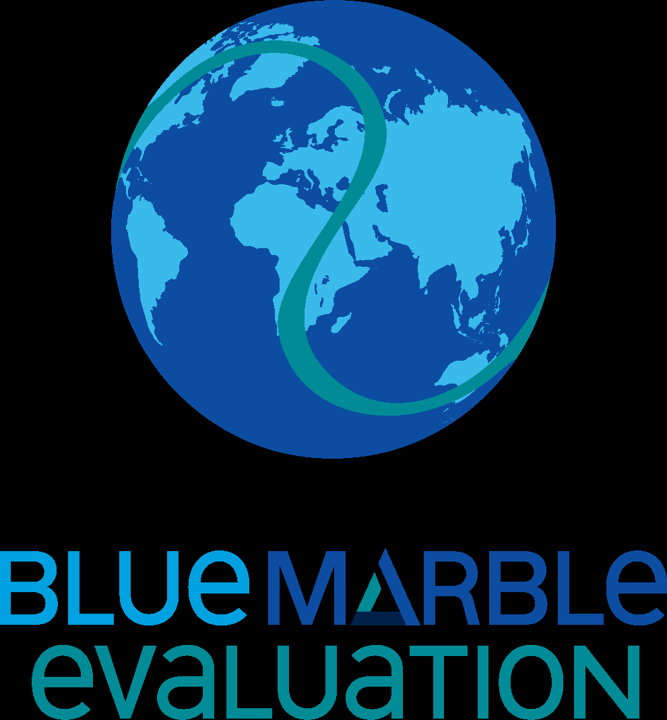I’m Michael Quinn Patton (MQP), founder and director of Utilization-Focused Evaluation and author of Blue Marble Evaluation.
Blue Marble refers to the iconic image of the Earth from space without borders or boundaries, a whole Earth perspective. We humans are using our planet’s resources, and polluting and warming it, in ways that are unsustainable. Many people, organizations, and networks are working to ensure the future is more sustainable and equitable. Blue Marble evaluators enter the fray by helping design such efforts, provide ongoing feedback for adaptation and enhanced impact, and examine the long-term effectiveness of such interventions and initiatives. Incorporating the Blue Marble perspective means looking beyond nation-state boundaries and across sector and issue silos to connect the global and local, connect the human and ecological, and connect evaluative thinking and methods with those trying to bring about systems transformations.

Blue Marble Evaluation integrates design, implementation, and evaluation. Evaluators bring their knowledge and expertise to bear in the design of resilient, sustainability-oriented, and equity-committed interventions and initiatives. When an intervention and, correspondingly, an evaluation fail to incorporate an ecological sustainability perspective, both are engaging from a closed system mindset, disconnected from larger patterns and realities—like turning a crank that isn’t connected to anything. It is essential for planners, implementers, and evaluators at the beginning of their work together to routinely analyze the sustainability and equity issues presented by the formulation of the intervention and the implications for evaluation. Blue Marble evaluation premises and principles provide a framework for that initial review, ongoing development and adaptation, and long-term evaluation of systems transformation contributions and impacts. But what does a Blue Marble Evaluation actually look like? Here’s an example.
Food Systems Transformation
On September 23, the United Nations hosted a global Food Systems Summit. As part of building momentum for the Summit more than 900 Independent Dialogues took place around the world engaging more than 100,000 people. Our Blue Marble Evaluation team coded the Dialogue reports to capture and communicate perspectives and insights from the Dialogues. The major themes that emerged from those Dialogues have now been published in a Synthesis Report (link listed below). Dialogue participants provided guidance on what is needed and envisioned to transform food systems. Transformation means major, significant, deep, and broad changes beyond piecemeal reforms, incremental change, and narrowly focused projects and programs. Participants spotlighted the importance of ensuring sustainability and strengthening resilience. Sustainability entails humanity and nature thriving together, with resilience as the capacity to regenerate and adapt. Resilience supports sustainability.
Dialogues also called for making equity a priority and treating everyone as a stakeholder in food systems transformation. Valuing diversity and engaging inclusively are essential to achieve equity. Dialogue participants called for all involved to act with urgency and to learn and adapt through ongoing evaluation. Participants recognized that climate change and the pandemic are having major effects on food and agriculture. Therefore, it is essential to build global transformation momentum across systems because the potential for food systems transformation is intrinsically tied to transformation of climate and health systems.
Rad Resources
· Blue Marble Evaluation workshop as part of the upcoming AEA virtual conference, October 29. https://www.evaluationconference.org/Programs/Workshops
· Synthesis of Food Systems Transformation Dialogues by the Blue Marble Network Team https://www.un.org/sites/un2.un.org/files/unfss_independent_dialogue_synthesis_report_3_0.pdf
· Learn more about Blue Marble Evaluation and join the Network: https://bluemarbleeval.org/

Do you have questions, concerns, kudos, or content to extend this aea365 contribution? Please add them in the comments section for this post on the aea365 webpage so that we may enrich our community of practice. Would you like to submit an aea365 Tip? Please send a note of interest to aea365@eval.org . aea365 is sponsored by the American Evaluation Association and provides a Tip-a-Day by and for evaluators. The views and opinions expressed on the AEA365 blog are solely those of the original authors and other contributors. These views and opinions do not necessarily represent those of the American Evaluation Association, and/or any/all contributors to this site.

Hi Michael,
Thanks for your insight on the Blue Marble Evaluation. It sounds like your utilized- focused evaluation is putting sustainability at the forefront of your evaluation practice and ensuring that the environment and equity are your top priorities in all evaluations. I try to live as sustainably as I can and make green choices wherever possible, so I’m happy to hear that the Blue Marble Evaluation also recognizes the urgent need to prioritize environmental initiatives. I agree that without incorporating an ecological sustainability perspective during evaluations, solutions may only be a temporary fix or distraction, as environmental issues continue to worsen.
I am currently taking a Program Evaluation course through Queen’s University. Your mention about valuing diversity and engaging inclusively, while maintaining an open mindset really stood out to me as traits of a positive and successful evaluator. In some of our readings and course activities, I’ve noticed that evaluators can often come across as the “only person with knowledge” and that stakeholders or program staff are not valued for their experiences and opinions. Often target populations don’t even know the purpose of evaluations because they’ve been left in the dark or objectives have not been communicated to them in a way they understand. I’ve learned that intentional communication choices help ensure all participants can access the information the evaluation provides and allow them to interpret and share any necessary feedback. This helps promote more positive change and deeper understanding in communities. Your description of Blue Marble’s evaluation regarding Food Systems transformation emphasized how thoughtful engagement can promote global change.
Over 100,000 people around the world were able to provide insight on a system that they are all affected by, how they get their food. Instead of only discussing food transportation with major companies, or a few select stakeholders, you treated everyone as a stakeholder and took their opinion into account. Thank you for shedding light on the importance of valuing diversity and how incorporating more voices can ignite urgency in promoting sustainable practices around the world!